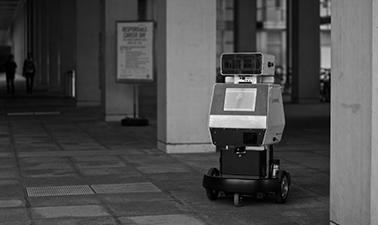Introduction to Autonomous Mobile Robots
basic concepts and algorithms for locomotion, perception, and intelligent navigation.

About this Course
Robots are rapidly evolving from factory workhorses, which are physically bound to their work-cells, to increasingly complex machines capable of performing challenging tasks in our daily environment. The objective of this course is to provide the basic concepts and algorithms required to develop mobile robots that act autonomously in complex environments. The main emphasis is put on mobile robot locomotion and kinematics, environment perception, probabilistic map based localization and mapping, and motion planning.
This lecture closely follows the textbook Introduction to Autonomous Mobile Robots by Roland Siegwart, Illah Nourbakhsh, Davide Scaramuzza, The MIT Press, second edition 2011. All required readings are available within the courseware, courtesy of The MIT Press. A print version of the course textbook, Introduction to Autonomous Mobile Robots, is also available for purchase. The MIT Press is offering enrolled students a special 30% discount on books ordered directly through the publisher’s website. To take advantage of this offer, please use promotion code IAMR30 at The MIT Press site.
The course runs from February 23rd, 2016 to June 12th, 2016. Grading in the course is derived from 9 problem sets and 2 quizzes.
Prerequisites
Good basic mathematics, physics, system modeling, and control.
Grading and Evaluation
Grading in the course comes from 9 online problem sets and 2 quizzes. Together, the problem sets are worth 50% of your grade and each quiz is worth 25% of your grade. You will have the opportunity to drop one of the problem sets from your mark. A grade of 60% or higher will be considered a pass.
Schedule
The schedule is subject to change and we will add video links as they are released. Please check back for the latest information.
| Week no. | Date of Lecture at ETH | Online release date | Title | Lecturer | Problem set |
|---|---|---|---|---|---|
| 1 | 23/02/2016 | 17/02/2016 | Introduction and Motivation | R. Siegwart | None |
| 2 | 01/03/2016 | 24/02/2016 | Locomotion Concepts | R. Siegwart | Optional |
| Ex1 | 01/03/2016 | 24/02/2016 | Introduction to the V-Rep Simulator | U. Schwesinger, M. Freese | |
| 3 | 08/03/2016 | 02/03/2016 | Mobile Robot Kinematics | R. Siegwart | Yes |
| 4 | 15/03/2016 | 09/03/2016 | Perception I | R. Siegwart | None |
| Ex2 | 15/03/2016 | 09/03/2016 | Kinematics and Control of a Differential Drive Vehicle | A. Vempati, M. Kamel | |
| 5 | 22/03/2016 | 16/03/2016 | Perception II | M. Chli | Yes |
| 29/03/2016 | Week off | ||||
| 6 | 05/04/2016 | 23/03/2016 | Perception III | M. Chli | Yes |
| 7 | 12/04/2016 | 06/04/2016 | Perception IV | M. Chli | Yes | Ex3 | 12/04/2016 | 06/04/2016 | Line Extraction | T. Hinzmann, R. Khanna |
| Q1 | 12/04/2016 | Quiz 1 | T. Novkovic, A. Millane, T. Schneider | ||
| 8 | 19/04/2016 | 13/04/2016 | Localization I | R. Siegwart | Yes |
| 9 | 26/04/2016 | 20/04/2016 | Localization II | R. Siegwart | Yes |
| Ex4 | 26/04/2016 | 20/04/2016 | Line-based Extended Kalman Filter | T. Hinzmann, R. Khanna | |
| 10 | 03/05/2016 | 27/04/2016 | SLAM I | M. Chli | None |
| 11 | 10/05/2016 | 04/05/2016 | SLAM II | M. Chli | Yes |
| Ex5 | 10/05/2016 | 04/05/2016 | EKF SLAM | T. Schneider, M. Popovic | |
| 12 | 17/05/2016 | 11/05/2016 | Planning I | M. Rufli | Yes |
| 13 | 24/05/2016 | 18/05/2016 | Planning II | M. Rufli | Yes |
| Ex6 | 24/05/2016 | 18/05/2016 | Dijkstra's Algorithm and the Dynamic Window | P. Krüsi, M. Pfeiffer | |
| Q2 | 24/05/2016 | Quiz 2 | T. Novkovic, A. Millane, T. Schneider | ||
| 14 | 31/05/2016 | 25/05/2016 | Summary | R. Siegwart | None |
You can find a PDF version of the course schedule here.
Optional Exercises
In addition to the graded content, this course offers 6 ungraded exercises in which students can write perception and planning software for a mobile robot that runs in simulation. The programming part is in Matlab or Octave and the simulation runs in the V-Rep simulator. Full instructions on how to get started are available on the exercises page.
